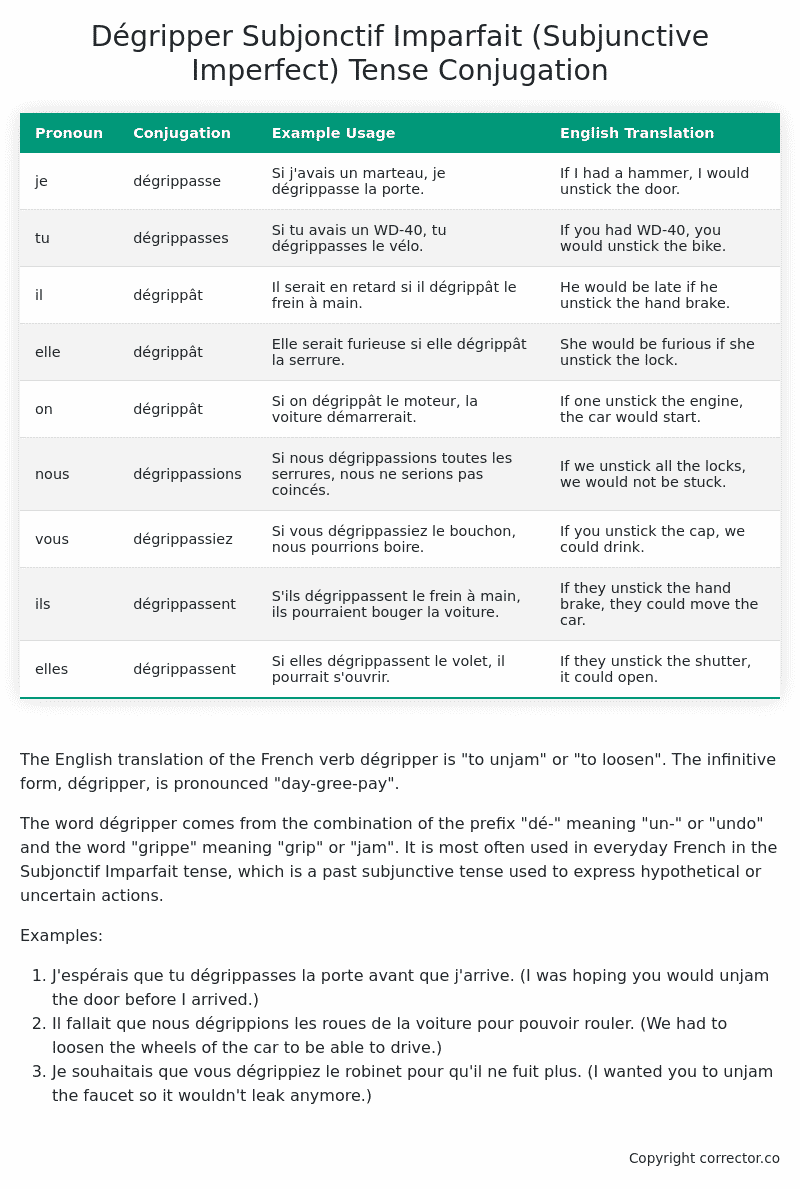Subjonctif Imparfait (Subjunctive Imperfect) Tense Conjugation of the French Verb dégripper
Introduction to the verb dégripper
The English translation of the French verb dégripper is “to unjam” or “to loosen”. The infinitive form, dégripper, is pronounced “day-gree-pay”.
The word dégripper comes from the combination of the prefix “dé-” meaning “un-” or “undo” and the word “grippe” meaning “grip” or “jam”. It is most often used in everyday French in the Subjonctif Imparfait tense, which is a past subjunctive tense used to express hypothetical or uncertain actions.
Examples:
- J’espérais que tu dégrippasses la porte avant que j’arrive. (I was hoping you would unjam the door before I arrived.)
- Il fallait que nous dégrippions les roues de la voiture pour pouvoir rouler. (We had to loosen the wheels of the car to be able to drive.)
- Je souhaitais que vous dégrippiez le robinet pour qu’il ne fuit plus. (I wanted you to unjam the faucet so it wouldn’t leak anymore.)
Table of the Subjonctif Imparfait (Subjunctive Imperfect) Tense Conjugation of dégripper
| Pronoun | Conjugation | Example Usage | English Translation |
|---|---|---|---|
| je | dégrippasse | Si j’avais un marteau, je dégrippasse la porte. | If I had a hammer, I would unstick the door. |
| tu | dégrippasses | Si tu avais un WD-40, tu dégrippasses le vélo. | If you had WD-40, you would unstick the bike. |
| il | dégrippât | Il serait en retard si il dégrippât le frein à main. | He would be late if he unstick the hand brake. |
| elle | dégrippât | Elle serait furieuse si elle dégrippât la serrure. | She would be furious if she unstick the lock. |
| on | dégrippât | Si on dégrippât le moteur, la voiture démarrerait. | If one unstick the engine, the car would start. |
| nous | dégrippassions | Si nous dégrippassions toutes les serrures, nous ne serions pas coincés. | If we unstick all the locks, we would not be stuck. |
| vous | dégrippassiez | Si vous dégrippassiez le bouchon, nous pourrions boire. | If you unstick the cap, we could drink. |
| ils | dégrippassent | S’ils dégrippassent le frein à main, ils pourraient bouger la voiture. | If they unstick the hand brake, they could move the car. |
| elles | dégrippassent | Si elles dégrippassent le volet, il pourrait s’ouvrir. | If they unstick the shutter, it could open. |
Other Conjugations for Dégripper.
Le Present (Present Tense) Conjugation of the French Verb dégripper
Imparfait (Imperfect) Tense Conjugation of the French Verb dégripper
Passé Simple (Simple Past) Tense Conjugation of the French Verb dégripper
Passé Composé (Present Perfect) Tense Conjugation of the French Verb dégripper
Futur Simple (Simple Future) Tense Conjugation of the French Verb dégripper
Futur Proche (Near Future) Tense Conjugation of the French Verb dégripper
Plus-que-parfait (Pluperfect) Tense Conjugation of the French Verb dégripper
Passé Antérieur (Past Anterior) Tense Conjugation of the French Verb dégripper
Futur Antérieur (Future Anterior) Tense Conjugation of the French Verb dégripper
Subjonctif Présent (Subjunctive Present) Tense Conjugation of the French Verb dégripper
Subjonctif Passé (Subjunctive Past) Tense Conjugation of the French Verb dégripper
Subjonctif Imparfait (Subjunctive Imperfect) Tense Conjugation of the French Verb dégripper (this article)
Subjonctif Plus-que-parfait (Subjunctive Pluperfect) Tense Conjugation of the French Verb dégripper
Conditionnel Présent (Conditional Present) Tense Conjugation of the French Verb dégripper
Conditionnel Passé (Conditional Past) Tense Conjugation of the French Verb dégripper
L’impératif Présent (Imperative Present) Tense Conjugation of the French Verb dégripper
L’infinitif Présent (Infinitive Present) Tense Conjugation of the French Verb dégripper
Struggling with French verbs or the language in general? Why not use our free French Grammar Checker – no registration required!
Get a FREE Download Study Sheet of this Conjugation 🔥
Simply right click the image below, click “save image” and get your free reference for the dégripper Subjonctif Imparfait tense conjugation!

Dégripper – About the French Subjonctif Imparfait (Subjunctive Imperfect) Tense
Formation
Common Everyday Usage Patterns
Interactions with Other Tenses
Subjonctif Présent
Indicatif Passé Composé
Conditional
Conditional Perfect
Summary
I hope you enjoyed this article on the verb dégripper. Still in a learning mood? Check out another TOTALLY random French verb conjugation!


